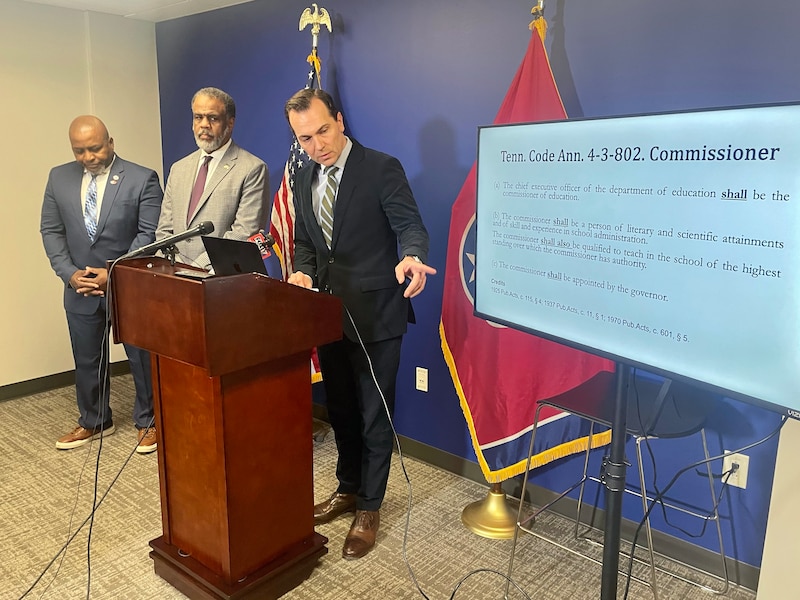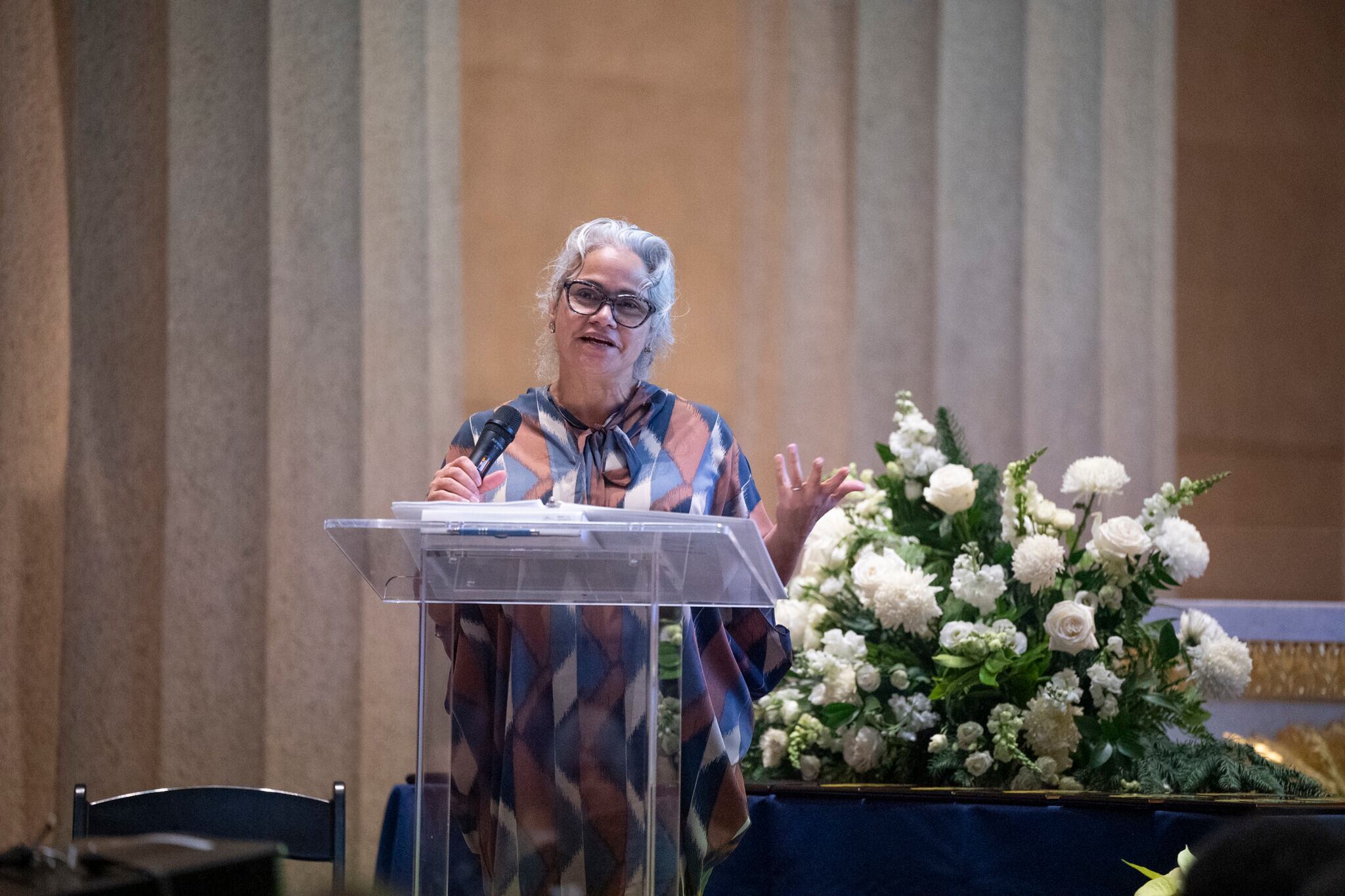House Democrats called Monday for the ouster of Lizzette Reynolds as Tennessee’s education commissioner over questions about whether she meets the state’s legal requirements for the job.
Reynolds has nearly three decades of policy and legislative experience in education at the state and federal levels. But she has no teacher’s license or experience leading a classroom, in apparent violation of a century-old state law requiring the commissioner to be a person “of skill and experience in school administration” and “qualified to teach in the school of the highest standing over which the commissioner has authority.”
Rep. John Ray Clemmons of Nashville, who chairs the House Democratic caucus, and Rep. Sam McKenzie of Knoxville, chairman of the legislature’s Black caucus, said Reynolds should step aside.
“There is no vagueness in this statute,” Clemmons said during a news conference at the state Capitol. “Commissioner Reynolds is legally unqualified, and she must resign.”
If she does not, McKenzie said, Gov. Bill Lee should fire Reynolds and hire a leader who understands the method of teaching, in both theory and practice.
“There are plenty of qualified people out there to lead this great education system we have,” McKenzie said.

Reynolds, who has a political science degree from Southwestern University in Georgetown, Texas, was hired last year to succeed Penny Schwinn.
Her job pays $255,000 a year, up from $236,000 when she started in July. The average salary of a licensed Tennessee teacher was $58,594 in 2021-22, according to the department’s most recent annual statistical report.
Reynolds previously was chief deputy education commissioner in Texas and most recently served as vice president of policy for ExcelinEd, founded by former Florida Gov. Jeb Bush to pursue education policies that he believes improve student learning and lessen inequities.
The challenge to Reynolds’ credentials comes as she works to implement multiple sweeping policy initiatives passed by Tennessee lawmakers during Lee’s first term in office.
Tennessee is in its first year of operating under a new education funding formula, and also must enforce a controversial 2021 reading law under which thousands of fourth-graders are expected to be held back this year, based on projections for state test results this spring. In addition, the state is overseeing large-scale tutoring and summer programs in response to learning losses during the pandemic. And Lee is seeking a massive statewide expansion of vouchers to let families use government money to send their children to private schools or some home schools.
Asked about the Democrats’ assertions, a spokesperson for the governor defended Reynolds’ experience, saying her credentials qualified her to serve as commissioner.
“We’re proud of the work she’s doing to accelerate academic achievement and support all Tennessee students,” said Elizabeth Lane Johnson, Lee’s press secretary. “Additionally, though not explicitly required by statute, Commissioner Reynolds is currently enrolled in the [University of Tennessee]-Martin Education Preparation Program to expand upon her previous experience.”
In an interview with Chalkbeat last July, three weeks after starting her job, Reynolds said Lee hired her for her ability to roll out policies.
Asked then about her lack of teaching credentials or experience, she talked about her public school experiences as a student and a parent.
“As a parent of public school kids, I’m as close to the classroom as you’re going to get, because I’m a consumer of the public school system,” she said.
The vast majority of Tennessee’s top education officials have been longtime educators with deep knowledge of and experience in the practice of teaching.
For example, Candice McQueen was the dean of Lipscomb University’s College of Education, which the state rates among its top teacher training programs, when Republican Bill Haslam chose her in 2014 to lead the state education department during his second term as governor. She had won multiple awards for her teaching at both the K-12 and college levels.
Lana Seivers, who served as Democrat Phil Bredesen’s education chief from 2003 to 2008, was a teacher, principal, and district superintendent in Tennessee for most of her career. She also served on a long list of state and regional boards related to K-12 and higher education.
Both McQueen and Seivers held multiple graduate degrees in education.
Several other recent commissioners had backgrounds that, like Reynolds, leaned more toward policy and politics. But they also had some non-traditional teaching experience. Schwinn, who preceded Reynolds in the Lee administration, and Kevin Huffman, who was Haslam’s education chief during his first term, started their careers in the classroom through Teach for America. Schwinn also had a brief stint as administrator over a charter school in Sacramento, California.
JC Bowman, executive director of Professional Educators of Tennessee, called Lee’s hires to lead the education department a “troubling trend,” even as he praised Reynolds for giving access to stakeholders.
“This governor has spurned people from Tennessee from key roles in state government,” he said. “There are highly qualified people from this state who know this state well.”
Leaders with the the state’s largest teacher organization said the governor should respond to questions that are being raised.
“It is Gov. Lee’s responsibility to know Tennessee state law and the requirements to serve as commissioner of education,” said Tanya T. Coats, president of the Tennessee Education Association. “In appointing the current commissioner, it appears his focus may have been on finding someone who would be on board with his privatization agenda and would enforce policies like A-F school grades that undermine our strong public schools.”
Editor’s note: This story has been updated with comments from the governor’s press secretary.
Marta Aldrich is a senior correspondent and covers the statehouse for Chalkbeat Tennessee. Contact her at maldrich@chalkbeat.org.






